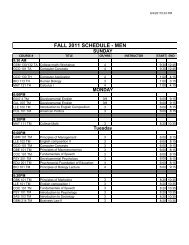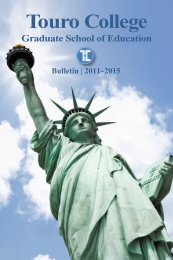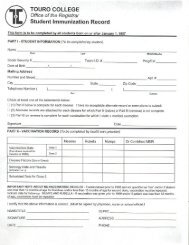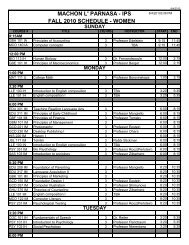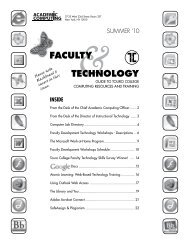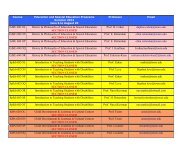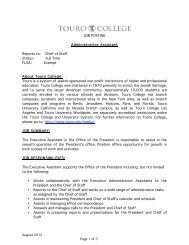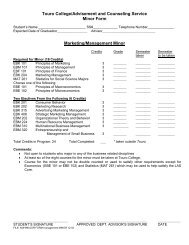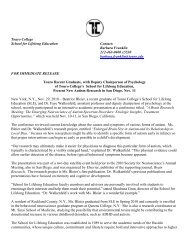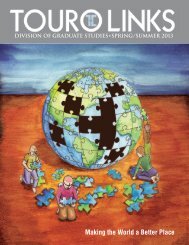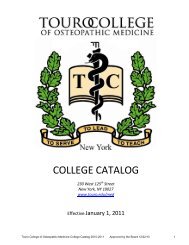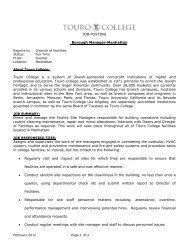Barbara Franklin Director of Communications 212 ... - Touro College
Barbara Franklin Director of Communications 212 ... - Touro College
Barbara Franklin Director of Communications 212 ... - Touro College
You also want an ePaper? Increase the reach of your titles
YUMPU automatically turns print PDFs into web optimized ePapers that Google loves.
Contact: <strong>Barbara</strong> <strong>Franklin</strong><br />
<strong>Director</strong> <strong>of</strong> <strong>Communications</strong><br />
<strong>212</strong>-463-0400 x5530<br />
<strong>Barbara</strong>.franklin@touro.edu<br />
For Immediate Release<br />
TOURO COLLEGE OF PHARMACY STUDENTS TRAVEL TO INDIA<br />
TO RUN HEALTH CAMPS IN POOR URBAN COMMUNITIES<br />
New York, N.Y. – March 5, 2013 – The women who had come to the makeshift “health camps” to see<br />
the student pharmacists from Harlem had ongoing pain in their bones. Some were so thin that their gaunt<br />
arms would not hold a blood pressure cuff. One man had collected so many medications that he stuffed<br />
them into two shopping bags and brought them to the camp to be sorted, identified and ultimately thrown<br />
away.<br />
“He had no idea what he was taking, or the expiration dates <strong>of</strong> his drugs,” said Steven Elrod, a doctor <strong>of</strong><br />
pharmacy (Pharm.D.) candidate at the <strong>Touro</strong> <strong>College</strong> <strong>of</strong> Pharmacy in Harlem. “He had ten years <strong>of</strong><br />
medications. Many were not needed. At the end he left with one small zip-lock bag.”<br />
Elrod was one <strong>of</strong> six <strong>Touro</strong> pharmacy students who, with three faculty members, recently ventured to the<br />
slums <strong>of</strong> India. The group spent four weeks in the poor neighborhoods <strong>of</strong> New Delhi and Agra, where<br />
most <strong>of</strong> the residents lack access to primary health care. They screened residents for hypertension,<br />
diabetes and pulmonary impairment. Residents needing treatment were referred for medical services, and<br />
attempts were made to counsel them on how to improve their health, prevent disease and use their<br />
medications properly.<br />
“The students were well-prepared for their work in India by the public health courses and training that is<br />
part <strong>of</strong> our curriculum, and by prior rotations addressing the needs <strong>of</strong> disadvantaged communities, a<br />
commitment <strong>of</strong> the <strong>Touro</strong> <strong>College</strong> <strong>of</strong> Pharmacy,” said Dr. Audrey Jacobson, M.D., MPH, pr<strong>of</strong>essor and<br />
director <strong>of</strong> public health education, practice and research, who helped lead the trip.<br />
In India, the <strong>Touro</strong> group collaborated with the Urban Health Resource Center (UHRC), a non-pr<strong>of</strong>it<br />
organization in New Delhi that works to improve health <strong>of</strong> the urban poor living in slums and<br />
settlements. The <strong>Touro</strong> students screened about 350 patients (more than twice as many as anticipated)<br />
and in addition to the counseling, created a database <strong>of</strong> proper medications that they left behind for UHRC<br />
to help residents obtain appropriate medications.<br />
In addition to Elrod, the other students participating were Glenn Morataya, Ravi Shah, Jillian Brown,<br />
Jessica Cate and Danny Tea. The students worked under the supervision <strong>of</strong> Drs. Jacobson, Dipan Ray,<br />
Ph.D., director <strong>of</strong> practice experience, and Ronnie Moore, Pharm.D., senior director <strong>of</strong> practice<br />
experience.<br />
The students showed unflagging dedication, working 10 to 14-hour days under physically trying<br />
conditions, <strong>of</strong>ten going without lunch and falling ill themselves. Sanitation was poor and the air heavily<br />
polluted. Supplies ran short and the hurdles were many, including cultural differences and disparities, and<br />
language barriers. UHRC staff helped the group understand some <strong>of</strong> the differences, taught them Hindi<br />
and helped them educate and counsel patients about the options available to treat their conditions.
Still, the students recall the many challenges. Patients were seen in living rooms, where families<br />
rearranged their furniture to accommodate the screenings, or small rooms resembling college dormitories.<br />
The conditions – short on space and privacy, coupled with language barriers - were not ideal for patient<br />
interviews, blood pressure readings and counseling. Translators and body language were called into play.<br />
Often patients did not return for counseling and when they did, advice given was not always followed.<br />
“No one knew the concept <strong>of</strong> a one month supply and adherence,” said Shah. “Medications were cheap,<br />
but not many knew how to take them properly,” said Morataya.<br />
Sometimes the students had to try to solve problems quickly as best they could, when there were no<br />
obvious solutions. For example, women with decreased lung function reported they lived in households<br />
with husbands or others who smoked; the students could only advise them to try to speak with family<br />
members about smoking away from the house. Others rode motorcycles in New Delhi’s highly-polluted<br />
streets. “We could only tell them to wear scarves and keep their faces covered outside,” recalled Tea.<br />
Brown wanted to go home after the first day. “It was a bit intimidating at first,” she said. Reflecting back<br />
though, Brown concluded the trip was one <strong>of</strong> the best experiences <strong>of</strong> her life. “I saw how people lived and<br />
how they didn’t have access to what we have. I saw the opportunity to educate patients and improve their<br />
quality <strong>of</strong> life.”<br />
Added Cate: “The whole experience embodied the potential for what pharmacists can be in the realm <strong>of</strong><br />
public health.” Cate’s colleague, Morataya, said, “This is where I learned public health, and on a global<br />
level, too.”<br />
Dr. Moore emphasized that the experience would not have been possible were it not for the assistance <strong>of</strong><br />
the UHRC. “Their organization and skills will be integrated into our ongoing public health efforts here in<br />
Harlem,” he said.<br />
Dipan Ray, Ph.D., director <strong>of</strong> practice experience at <strong>Touro</strong> <strong>College</strong> <strong>of</strong> Pharmacy in<br />
Harlem (middle), and Ravi Shah, a doctor <strong>of</strong> pharmacy (Pharm.D.) candidate at<br />
the <strong>College</strong> (right), work together to interview a patient at a makeshift “health<br />
camp” in New Delhi. They were part <strong>of</strong> a team <strong>of</strong> six students and three faculty<br />
members who recently ventured to the slums <strong>of</strong> India where most <strong>of</strong> the residents<br />
lack access to primary health care. They gathered information on diet, past<br />
medical history and current medications in order to provide an optimal check up.<br />
Photo credit: Danny Tea



